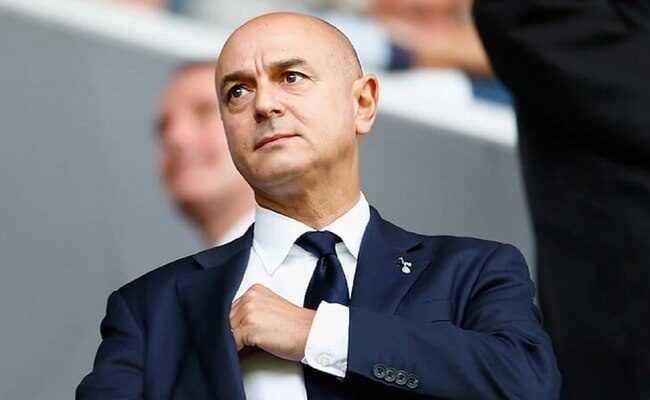The news landed like a perfectly weighted pass, yet for many, the reaction was more a collective sigh than a gasp. After 24 years at the helm of Tottenham Hotspur, Daniel Levy, the Premier League`s longest-serving chairman, has departed. For over two decades, Levy`s name was almost synonymous with Spurs` aspirations, frustrations, and an undeniably transformative, albeit often trophy-light, journey. His legacy is not a simple ledger of wins and losses, but a sprawling narrative of ambition, fiscal prudence, architectural marvels, and the inherent challenges of steering a modern football club.
From Modest Beginnings to European Regulars
When Levy assumed the executive chairman role in February 2001, Tottenham Hotspur was a club adrift. Far removed from the “big five” status it once boasted at the Premier League`s inception, Spurs frequently flirted with mid-table obscurity, even staring down relegation in the early 90s. Trophies were distant dreams, European football an occasional, often fleeting, flirtation. Levy`s initial mandate was clear: stability, growth, and a consistent challenge for continental qualification.
He delivered. Slowly, painstakingly, Spurs began to climb. The era saw the consistent presence of Tottenham in European competitions for 18 out of 20 seasons, a stark contrast to their previous sporadic appearances. This wasn`t achieved through reckless spending but shrewd player trading. Talents like Robbie Keane, Dimitar Berbatov, Gareth Bale, Luka Modric, and Kyle Walker arrived, flourished, and were eventually sold for significant profits, allowing the club to reinvest. It was a business model often criticized by fans craving instant glory but one that fundamentally cemented Tottenham`s place among England`s elite, consistently competing for a Champions League berth – a position once unthinkable.
The Concrete Legacy: A Stadium for the Ages
Perhaps Levy`s most tangible and undeniably magnificent achievement is the Tottenham Hotspur Stadium. Opened in 2019, this 62,000-seat arena is not merely a football ground; it`s a multi-purpose entertainment complex, generating substantial revenue from NFL games, concerts, and other events. It stands as a monument to Levy`s vision and financial acumen, a state-of-the-art facility that catapulted Spurs into the top tier of global sports enterprises.
Building such a cathedral of sport without the backing of a nation-state or an oligarch`s bottomless pockets is, in the modern landscape of football, an almost Herculean feat.
It showcased a meticulous attention to detail, a relentless pursuit of commercial advantage, and an understanding of the business of football that few could rival. This achievement alone cemented Tottenham`s financial future, transforming it from a respectable club into a bona fide global brand.
The Perpetual Paradox: Sporting Success vs. Financial Prudence
Yet, for all the financial wizardry and architectural grandeur, one critique consistently shadowed Levy: the dearth of silverware. A single League Cup and a memorable, but ultimately unsuccessful, Champions League final appearance are often cited as insufficient returns for a club of Tottenham`s standing and ambition. This created a peculiar paradox: a club with elite infrastructure, a strong financial footing, and a consistent presence among Europe`s best, yet rarely able to take that final step to claim a major trophy.
The narrative often painted Levy as unwilling to spend, a miserly chairman prioritizing the balance sheet over trophies. However, recent figures tell a different story. In the last five years, Tottenham has amassed a net spend deficit of approximately $760 million, ranking among the highest in the Premier League. The challenge wasn`t necessarily a lack of spending, but perhaps the efficacy of that spending. It raised questions about the club`s recruitment strategy and the structure supporting it. Had the architect of the stadium inadvertently become the bottleneck for the team on the pitch?
The Evolving Game: From One-Man Band to Orchestrated Symphony
This is where the evolving nature of modern football management truly comes into play. In the early 2000s, a strong, centralized chairman like Levy could effectively run much of the club. However, as football transformed into a multi-billion-dollar industry, the demands grew exponentially. Clubs like Liverpool and Manchester City demonstrated the power of robust sporting departments, data-driven recruitment, and specialized roles from top to bottom.
For too long, Tottenham seemed to lag in adopting this multi-faceted approach. Sporting directors came and went, their influence often seemingly diluted, leading to an inconsistent transfer policy. The delay in building a truly comprehensive, modern sporting structure might be viewed as one of Levy`s significant missteps in his later years. It`s a testament to his individual capability that he managed for so long, but it ultimately became an albatross around the club`s neck, hindering the very sporting success that fans craved. Even the belated, albeit promising, steps to bolster the women`s team came years after many rivals had recognized the burgeoning potential.
The Unfinished Symphony and Future Judgments
Daniel Levy`s departure marks the end of an extraordinary era. He leaves behind a club fundamentally transformed: financially robust, globally recognized, and housed in one of the world`s finest stadiums. He built a club that, in many ways, outgrew the very model he perfected. His legacy is complex, a blend of visionary leadership and what might be seen as an outdated approach to sporting execution.
It is often said that history judges leaders more kindly than their contemporaries. For Daniel Levy, the true value of his imperfect, yet undeniably profound, transformation of Tottenham Hotspur may only become fully appreciated years from now, as the club continues to build upon the formidable foundations he meticulously, and controversially, laid. The architect has left the building; now, it`s up to others to finish the symphony.









